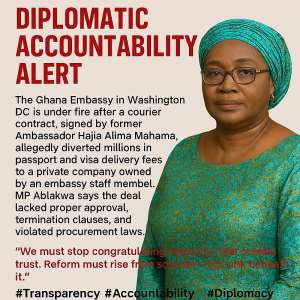
In the quiet corridors of Ghana’s Embassy in Washington, D.C., a seemingly routine administrative solution has erupted into one of the most scrutinized diplomatic controversies in recent memory. At the center of the storm is a courier contract signed in January 2023 between then-Ambassador Hajia Alima Mahama and Ghana Travel Consultants (GTC), a private firm owned by the Embassy’s IT officer, Fred Kwarteng.
What began as a logistical fix to address delays in passport and visa deliveries has now become a case study in alleged procurement violations, conflict of interest, and financial impropriety — with implications that reach far beyond embassy walls.
The Rise of GTC and the Alleged Scheme
Fred Kwarteng’s role extended far beyond IT support. As early as 2019, he was queried for creating a cloned embassy website and rerouting applicants to his personal business. Despite internal warnings, his firm, GTC, continued growing in influence. By 2023, the Embassy had formally designated GTC as its “preferred and recognised” courier partner — a move critics say institutionalized a private operation that siphoned off public revenue.
MP Samuel Okudzeto Ablakwa estimates that the firm earned over $4.8 million annually from unregulated fees, with minimal state oversight and no traceable remittance to government accounts. He alleged that “Ghana’s diplomatic mission became a gateway for private enrichment,” describing the arrangement as “criminally unacceptable.”
Ambassador Alima Mahama’s Involvement and Defense
Ambassador Mahama has maintained that the contract was a no-cost, indemnified solution that relieved logistical burdens and improved service delivery. She emphasized that “applicants paid directly to the company” and insisted the Embassy was never financially exposed.
Yet the contract was reportedly signed without prior Ministry clearance, lacked a termination clause, and formalized operations previously deemed unauthorized. Ablakwa argues that Mahama’s endorsement of a subordinate previously flagged for misconduct reflects “a troubling culture of informal arrangements within formal institutions.”
National Fallout and Diplomatic Consequences
The Embassy was temporarily closed for restructuring and forensic audits. EOCO has initiated investigations into the financial flow and legitimacy of the contract. The United States placed Ghana on a visa processing watchlist, citing “irregularities in diplomatic handling.” Public confidence in foreign missions has eroded, with growing calls for greater transparency and oversight.
Recommendations for Reform and Civic Safeguards
To ensure this episode becomes a turning point rather than a precedent, the following strategic reforms are worth considering:
1. Institutionalize Procurement Protocols for Missions Abroad
The Ministry of Foreign Affairs should codify standardized contracting rules for diplomatic posts, including mandatory approval processes and audit trails.
2. Strengthen Diplomatic Oversight Mechanisms
Regular third-party audits and performance reviews must be embedded in foreign mission operations, not triggered only in crisis.
3. Enact Consular Transparency Legislation
A Consular Services Bill should mandate public disclosure of service charges, contractor identities, and complaint resolution pathways.
4. Launch Civic Education Campaigns on Embassies’ Roles
“Many Ghanaians are unaware of how embassies function — and where service boundaries lie,” notes a retired diplomat. Public engagement must bridge this gap.
5. Asset Recovery and Restitution Where Violations Are Proven
“If funds meant for the state were intercepted, recovery must follow — not just accountability,” argues a legal scholar involved in governance reform.
A Wake-Up Call for Ethical Stewardship
As this saga continues to unfold, it must not be reduced to a diplomatic feud. It reveals a deeper truth — that informal discretion, when unchecked, can undercut the integrity of Ghana’s institutions and tarnish its international image.
The public deserves not just an explanation, but action. In the words of an anti-corruption advocate: “We must stop congratulating ingenuity that erodes trust. Reform must rise from scandal — not sink beneath it.”
Retired Senior Citizen
Teshie-Nungua
[email protected]


